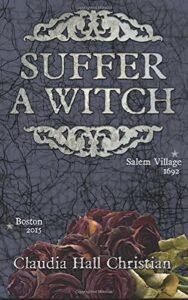When I can’t sleep I read, but sometimes I am involved in books that are so captivating that I want to read the story during any free moment I find. Claudia Hall Christian is an author who writes that kind of book. Her latest release is called “Suffer A Witch,” and it takes place in Salem Village circa 1692 AND in modern day Boston circa 2014. The story is a trial of good and evil, and it brings the Salem Witches face to face with their toughest challenge yet – their own demons.
So I love everything witches and most definitely have always been interested in the Salem Witch trials. There were more than 200 people falsely accused of practicing witchcraft and were tried in 1692 in Massachusetts. Twenty individuals were executed—19 by hanging and one by being pressed to death with heavy stones. It was a time of irrational fears when people constantly worried about the devil infiltrating their communities. We all know what happens when our fears get the best of us.

Here is a quick synopsis of the book from her website:
Em for Martha. Em for “Emogene Peres” the name she received in Boston less than a day after she’d been hanged in Salem Village in September 1692. Em and most of those hanged as Salem Witches were transformed into immortal witches only a few hours after they were deemed Salem Witches. Three hundred and twenty-two years later, they live, work, and love in modern-day Boston, Massachusetts where Em runs a spiritual store called the Mystic Divine, just off the Boston Commons.
On the anniversary of the first hanging, June 10, 2014, Em learns that a young man and a team of ghost hunters have dedicated themselves to finding the crevice where the Salem Twenty’s bodies were stuffed after hanging. The problem is that Em and the rest of the Salem Twenty are making full use of those skeletons. What starts with a young man with big ideas brings the Salem Witches face-to-face with their demons.
Knowing the Salem witch trials are a factual part of history makes Claudia’s story all the more intriguing.
Fictional story aside, the fact is that in the aftermath of the Salem witch trials, the colony of Massachusetts acknowledged the errors and injustices that had taken place. In 1711, the court declared the trials unlawful, and the affected families were compensated for their losses. The event has since become a symbol of the dangers of unchecked hysteria, flawed judicial systems, and the importance of due process.
Claudia Hall Christian’s book does the real story justice while also adding a layer involving the spiritual clash between a (wo)man and his/her inner self.





